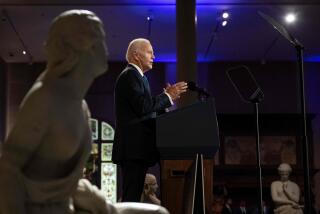PERSPECTIVE ON RUSSIA : Despair Craves Strong Medicine : Yeltsin goes home to an atmosphere charged by angry nationalism; will the U.S. follow through on summit goodwill?
It took more than a year--and a hard-driving summit performance--for Russiaâs first democratically elected president, Boris Yeltsin, to emerge from the shadow created by American affection for Mikhail Gorbachev. Thank goodness the American popularity contest between them is over and Yeltsin now stands a chance of being taken seriously in his own right. It didnât happen a moment too soon.
President Yeltsin was not exaggerating when he likened the current situation in his country to the period before the Bolshevik seizure of power in 1917. In the last few months, Russia has been riddled with 1,000% inflation, a dangerous power struggle between the executive and parliamentary leadership and a cash crisis that threatens to bring about further loss of production and even possibly a general strike on July 1.
In undertaking economic shock therapy, Yeltsin has had to adopt policies that directly violate the âinterestsâ of virtually every social group in the country. His only support has come from the recognition among many citizens that some strong medicine would be required to bring about real reform in the country. Liberated after 75 years of Communist domination, most Russians thought that âfreedomâ and âthe marketâ would miraculously bring about an instant transformation of both their living standards and the Westâs attitude toward their country. Instead of these gains, however, the impoverishment created by shock therapy has affected even the most ardent Yeltsin supporters, and the disillusionment with the âall talk and no actionâ promises of the West up to now has created a new political alignment, spurred by the Russiansâ deepening crisis of confidence.
The end of the Cold War, the âloss of Eastern Europe,â the collapse of the Soviet Union--and the superpower status that went with it--have left deep scars in Russia. Worrisome psychological signs are surfacing, similar to the mood in Germany after its defeat in World War I and the ensuing economic dislocation and chaos.
Even before the ink had dried on last weekâs historic new arms-control agreement, nationalist chauvinists and Communist hard-liners, who are gaining support by the day, went on the offensive against Yeltsin, accusing him of national betrayal and unilateral surrender. Pravda blasted Yeltsin for a âhasty and unjustified concession to Washington--and the final loss of Russiaâs status and significance as a superpower.â
The concern that Russia has lost its status, combined with government insolvency, hyper-inflation and the prospect and reality of massive unemployment, have made ordinary Russians increasingly receptive to the escalating anti-American rhetoric. The growing sense of futility and powerlessness is reflected even in such a progressive newspaper as Komsomolskaya Pravda. In a recent article it described the situation: âIt can now be said unequivocally that no light can be seen at the end of the tunnel and long torments still lie ahead of us.â
These sentiments are fertile soil for extreme Russian nationalism, which could threaten the security of both the West and the newborn countries that have emerged from the former Soviet Union. With the Russian military flexing its muscles, ready to protect aggrieved Russian minorities in places like Moldova and South Ossetia in Georgia, even moderate and anti-Communist support is growing for pan-Russian ideals that reject Western values and âdictates.â
Despite the high note struck by the conclusion of the summit, Washingtonâs perilous delay in providing Russia with massive technical assistance and some debt relief may have cost us dearly. Nevertheless, it is important that the United States take its summit rhetoric seriously and indeed begin an era of partnership. That means that the United States, despite the presidential campaign season, has to be sensitive to the tension brewing in Russia and curb its bellicose rhetoric about being the sole superpower and the winner of the Cold War. We must also take our promises of engagement seriously and regard them as unshakable commitments, even if times become more tense in the coming months.
If we fail to vigorously pursue this cooperation and expand it in every possible way, we could find to our peril that the summitâs 39 new agreements came tragically late. In such a case, we would lose not only an important strategic opportunity for the United States but also the historic chance to finally bring the nuclear menace under control.
More to Read
Sign up for Essential California
The most important California stories and recommendations in your inbox every morning.
You may occasionally receive promotional content from the Los Angeles Times.










